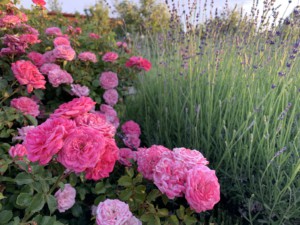June 2020
by Scott Canning, Director of Horticulture and Special Projects
I was looking back at my columns, and I don‘t think I have ever written for June. Not surprising, I guess, because May is so damn busy, and June is our cruelest month. Consistently dry, with skin–cracking low humidity and a punishing sun that grows stronger until late in the month. Tempts a gardener to stay inside...
But that ain‘t an option. While most of your planting in the flower garden should be finished until later in the summer, there are other chores, especially watering and weeding.

Rosa × ‘Meiswetdom’ SWEET DRIFT
Now is a great time to double–check your irrigation to be certain there aren‘t blockages, breaks, or dead zones, because malfunctioning irrigation in June will indeed create dead zones! Be sure you have increased irrigation around established trees; people forget that irrigation adequate for a young tree will not sustain a tree as it grows.
Finish mulching as soon as possible because mulch retains moisture, cools the root zone and suppresses weeds. I always harp on weeding, so I won‘t even mention it this month. Got it?
In the “veg” garden, as they lovingly call it in the U.K., spring is over. Time to harvest or remove the cool-season crops like peas, spinach, delicate lettuces and arugula (although “wild” or “rustic” arugula is much more heat tolerant– it is a different but closely–related species that is extra–pungent). Replace these with summer crops of beans, chiles, chard and other heat loving crops. Compost what you can‘t use from the remains of spring
Be sure your support system for “indeterminate” tomato plants is in place soon. These differ from bush varieties in that they continue to grow all season long and become quite large. “Determinate” or bush types tend to flower profusely in July and set almost all of their fruit at once. This is great for commercial production, but also for small spaces, and these include many of the “patio” tomato varieties.
Keep an eye out for the little white moths that are the parents of cabbage loopers. These can be excluded from cruciferous crops with Reemay or light floating row cover. Unlike squashes, chiles, and other “fruit“, they don‘t need pollination, so excluding insects mechanically is a safe, organic approach.
Keep weeding and watch your watering, and try to survive our cruelest month. Let‘s all pray for an early and generous monsoon season! And did I say “weed“?


